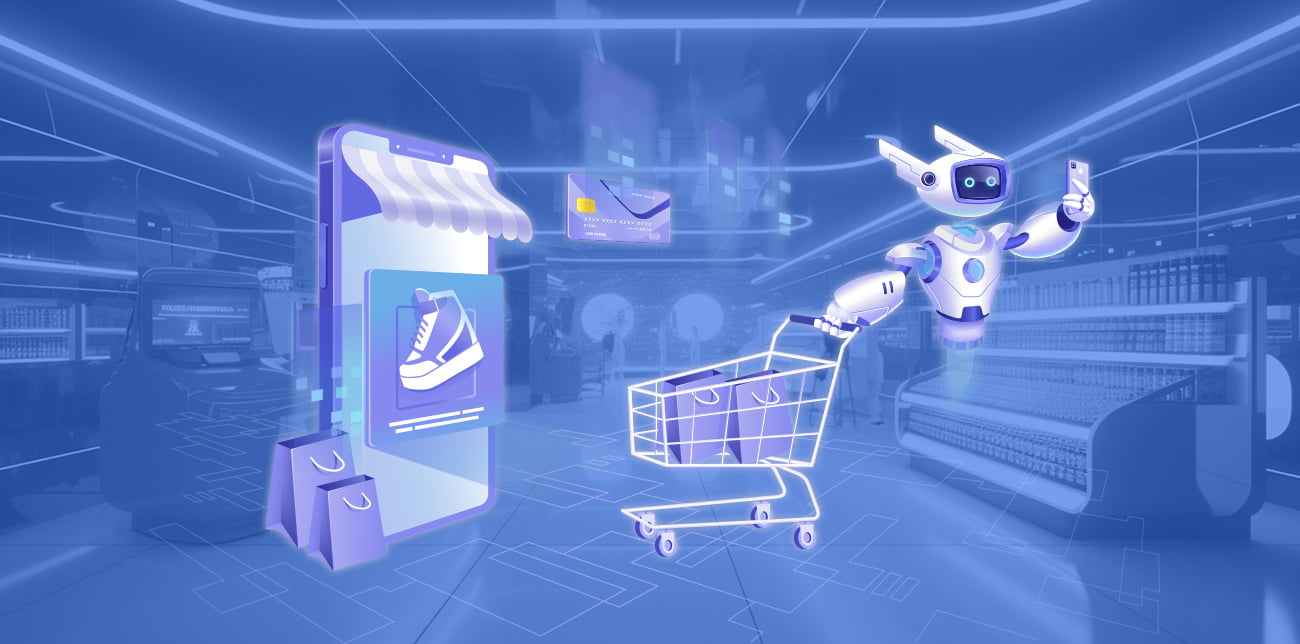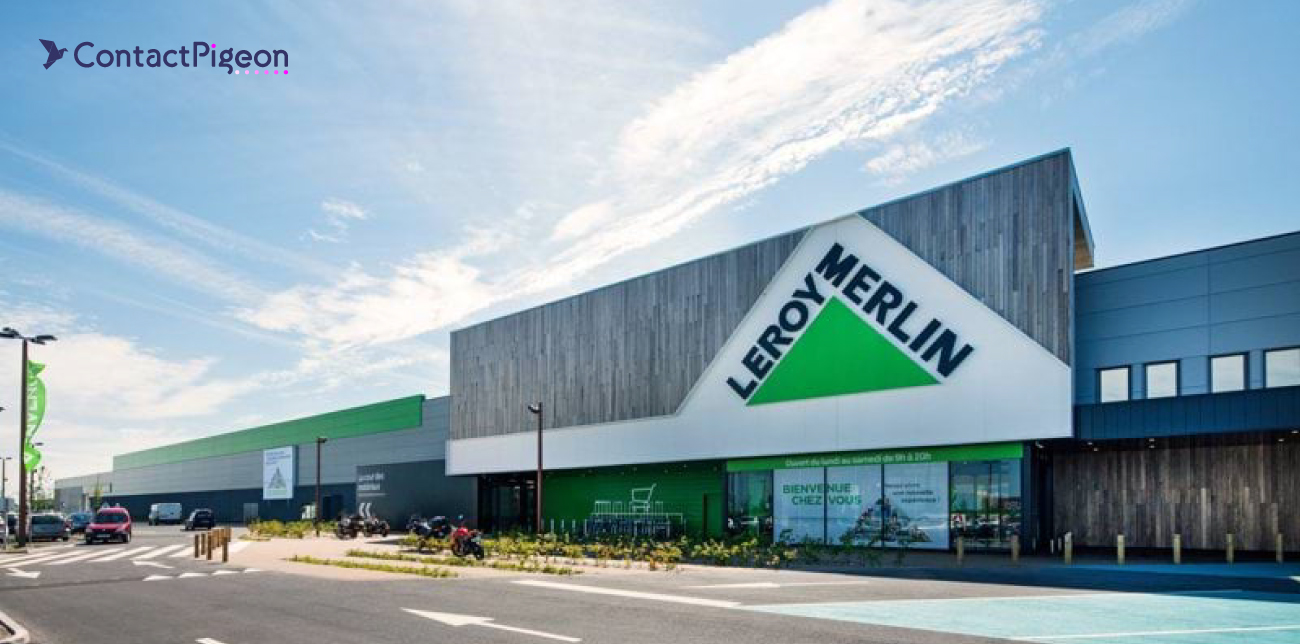In the last few years, the world has faced volatile economic conditions, intense competition, and extreme turmoil, that have evolved customer shopping behavior into an ambient experience. Spanning and emerging digital, physical, virtual, and social platforms, 73% of shoppers anticipate brands to comprehend their uniqueness and needs. All these changes have made future retail less about consumers choosing which channel to engage, and more about retailers reaching customers in the places they spend their time. In hindsight, the key to these challenges has been adaptability, data-driven decision-making, and, of course, a keen eye for new emerging trends.
Table of Contents
- > Key Retail Insight #1: The technologies that will shape the future of retail by 2035
- > Key Retail Insight #2: The ‘phygital’ shopping experience is here to stay
- > Key Retail Insight #3: Sustainability in Retail will not be just another trend
- > Key Retail Insight #4: Data Privacy and Data Security will become key ingredients to any retailer’s strategy
- > Key Retail Insight #5: The future of retail stores belongs to the hybrid omnichannel experience
- > What are the future predictions of CEOs for the retail industry in 2035?
- > Is the future of retail bright, or not?
This article lays a map of the latest retail insights to prepare retailers for the next phases of retail and will elaborate on strategy, technology, marketing, and organization. So without further ado, let’s begin our journey to the future.
Key Retail Insight #1: The technologies that will shape the future of retail by 2035
The impact of technology in the future of retail is already in place and runs through sales, marketing, customer service, and operations. Although it may be easy to build a brand only on data, retailers also have to understand how their customers are feeling. A personalized, frictionless customer journey goes without saying nowadays, and technology is a significant ally in this process. Take a look at the retail insights below and get inspired.
Artificial intelligence and machine learning
Similar technologies to ChatGPT and AI conversational models have gained huge traction and popularity. In April 2023 alone, ChatGPT had 1.8 billion visits, an impressive number that showcases how far AI has come. With that in mind, it can be safely deduced that AI and ML have changed significantly the way customers interact with brands, just as much as retailers have altered the ways they promote their products and services. Besides providing answers for everyday inquiries, if used properly, AI and ChatGPT can aid retailers in their operations, giving effective and fast solutions to problems.
AR/VR and Metaverse
Although 61% of consumers tend to go for retail brands that offer AR services, 52% of retailers admit that they cannot sustain this technology in their business. AR and Metaverse technologies are not for the faint of heart indeed, and the cost of implementation may be significant, but in the long run, it will accelerate revenue and growth, as they provide on-the-spot solutions.
Customers can see in real-time what their item will look like, customize it and eliminate any doubts that will prevent them from completing an online purchase. Additionally, Metaverse and VR offer immersive experiences that can captivate consumers by appealing to their emotions.
Robotics and automation
AI-powered robots are an effective solution when it comes to streamlining everyday operations in a retail business. Optimizing inventory management, supply chain shortages, and pricing, robotics eliminate silos, waste, and human errors, while coping with huge amounts of data. Moreover, the use of robots can assist retailers with inconsistencies and achieve a unified brand image across different sources and touchpoints. On the other hand, automated workflows allow retailers to save time and offer personalized interactions with relevant content that targets customers individually.

Key Retail Insight #2: The ‘phygital’ shopping experience is here to stay
The phygital model is an omnichannel strategy that combines digital elements to a brick-and-mortar store, or physical elements to an online store, offering a connected and seamless customer experience. The importance of fusing a physical storefront with digital elements and vice versa is crucial, given that consumers still prefer the in-person approach, but always check every product or service online.
Streamlining online and offline operations provides an immersive customer journey that is direct, interactive, and targeted. A phygital strategy will keep your customers engaged, making their shopping lives easier, increasing AOV, and boosting brand loyalty. Moreover, promoting your brand both online and offline will make your business more credible and build awareness around your name.
One of the many perks of a phygital approach is personalized recommendations and services, which can be achieved by merging data through disparate sources and touchpoints. Creating unified customer profiles will aid all retail businesses understand the needs of their audience and address them with no friction.
Key Retail Insight #3: Sustainability in Retail will not be just another trend
Today’s consumers differ significantly from boomers, with the latest generations operating in a more environmentally-friendly fashion. This change in their everyday habits is reflected in multiple lifestyle choices and, of course, their shopping behavior would not be unaffected. Supporting social change and environmental causes has been the new normal in 2023, and every brand that adopts sustainable practices is already in the audience’s good graces.
But the key to achieving a lifelong, loyal customer base is embracing this strategy in its entirety, not just following because of a trend, as consumers are paying close attention to details. Sustainability in retail has to include a variety of operations, from shipping and packaging to the quality of the products and their longevity. A circular economy and a reduced carbon footprint will make brands more eco-friendly and greener.
Additionally, brands have to embrace a sustainable policy inside the workplace and be consistent with work-life balance issues, equal opportunities, and fairness. Some extra measures that retailers have to implement include recycling strategies, and upholding collaborations with like-minded partners to promote an ethical supply chain.
All these changes can be achieved with the use of AI, ML, and cloud technologies, aiding brands to meet these high standards. Future retail lies in the use of technological advancements, optimizing operations, and increasing efficiency.
Key Retail Insight #4: Data Privacy and Data Security will become key ingredients to any retailer’s strategy
Customer satisfaction in retail is interconnected with the extensive use of data. Without enough information about consumer behavior and patterns, retailers cannot achieve personalized and interactive engagements. However, vast amounts of data require a certain level of protection, so industry professionals need to be aligned with the latest retail insights about data privacy and security.
Shoppers are becoming more and more aware of their data rights, and their concern increases over time. They need to be informed about how their information is being collected, processed, and stored, making the regulatory landscape stricter. Hence, retailers need to adhere to the latest data protection regulations and guidelines, like GDPR in the EU and CCPA in the USA.
Cybersecurity, collection transparency, and ethical use of data are not just vague terms anymore, it’s what the future retail commands. Apart from facing legal action, retailers need to protect their customers’ data, as it builds trust between the audience and the brand, giving a competitive advantage. Retailers can secure their data by establishing solid, trustworthy relationships with third-party data vendors, utilizing data encryption, ensuring the safety of their network, and training their employees.
Key Retail Insight #5: The future of retail stores belongs to the hybrid omnichannel experience
One of the most important retail insights of the future is embodying a hybrid omnichannel customer engagement strategy, as consumers value convenience, personalization, and flexibility in their shopping experience. Integrating various channels eliminates silos and allows retailers to interact with their customers in their favorite touchpoints, creating an ambient experience. A successful hybrid omnichannel experience requires careful planning and execution. Retailers need to invest in robust technologies to achieve optimal results and differentiate their brands from the competition.
What are the future predictions of CEOs for the retail industry in 2035?
Retail CEO #1: Jake Munday, CEO, Customneon
CEO: Jake Munday | https://customneon.com | LinkedIn |
In 2035, the customer experience will be entirely transformed due to emerging technologies and innovations. Customers will enjoy a personalized, frictionless shopping journey that is powered by seamless integrations across online and physical stores. AI-enabled virtual assistants will provide shoppers with real-time advice on product selection and services.
We’ll also witness an exponential increase in the use of voice commands for shopping, as it offers customers a more natural way to interact with technology. Furthermore, shoppers will benefit from virtual/augmented reality experiences that bring products to life within their own homes or local stores, thus allowing them to make purchase decisions with confidence.
Technologies such as 5G networks, facial recognition systems, blockchain solutions, etc, will form the backbone of the customer experience in 2035. They will not only improve speed and accuracy but also dramatically enhance customers’ overall experience. Consumers are increasingly looking for innovations, not just to streamline service, but also ways to be wowed. Retailers should start preparing now to take full advantage of these revolutionary solutions – after all, they are key to a compelling customer journey!
I always think of the movie Minority Report, with holographic and transparent displays, addressing the shoppers by name as they enter the store and suggesting products and services based on personalized data. It seems these technologies are closer than we think!
Retail CEO #2: Ryan Mckenzie, Co-Founder & CMO, tru.earth
Co-Founder & CMO: Ryan Mckenzie |https://www.tru.earth/ |LinkedIn
I believe that retail in 2035 will be geared toward sustainability and environmental responsibility. Customers will be more aware and conscious of their impact on the planet and will demand products and services that align with their values. Technologies that enhance sustainability will be at the forefront, such as circular and closed-loop systems that reduce waste and promote reuse.
The use of recycled and upcycled materials will become the norm in packaging, store fixtures, and displays. Consumers will also expect a seamless omnichannel experience, with the integration of virtual reality and augmented reality enabling immersive shopping experiences.
Lastly, I predict that consumer data privacy will become of utmost importance, with retailers adopting more transparent data collection and use policies.
Retail CEO #3: Cesar Cruz, Co-founder, Sebastian Cruz Couture
Co-founder Cesar Cruz| https://www.sebastiancruzcouture.com/ | LinkedIn
For most retailers to keep up with the streamlined customer service approach of digitally-forward marketplaces like Amazon, businesses will need to think strategically about providing faster online processes for customers. For example, customers need to be able to submit returns quickly, without interacting with a customer representative, and have the ability to choose from multiple dropoff points as an added convenience. In 2035, the customer experience will be rooted in speed and convenience, even more so than we see today.
Retail CEO #4: Erin Banta, Co-Founder & CEO, Pepper Home
Co-Founder & CEO: Erin Banta | https://pepper-home.com/ | LinkedIn
The future of retail is going to see more power given to the customer. This means that instead of companies trying to fit their target audience into their business model, they’re going to create and shift their business models according to the customers’ needs and wants. Passing the reins to the customer will not only help retail businesses tailor their products but will give customers a sense of ownership that will make them feel valued, thus boosting customer loyalty.
Retail CEO #5: Eran Mizrahi, CEO and co-founder, Ingredient Brothers
Co-Founder & CEO: Eran Mizrahi | https://www.ingredientbrothers.com / & https://nuts.com/ | Linked
One of the most significant changes we’ll see in the retail industry in 2035 is the rise of virtual and augmented reality. Customers will be able to browse and interact with products in immersive virtual environments, providing a more engaging and personalized shopping experience. In-store experiences will also be hugely transformed with the integration of AI and other technologies that can help retailers understand customer preferences, optimize inventory management, and improve operational efficiency. AI is here to stay, we just have to work with it, in this way retailers will always be at the top of their game. But they need to be mindful of the human workforce while they’re integrating AI into their businesses.
We can certainly expect to see more significant adoption of contactless and cashless payment methods, as well as more sophisticated biometric authentication systems. These technologies will not only provide a more convenient and secure shopping experience but also enable retailers to collect valuable data about their customers’ shopping habits. Countries in Eastern Asia are doing it, and consumers will start expecting the same perks soon. As sustainability and social responsibility become increasingly important to consumers, we can also expect retailers to prioritize ethical and sustainable sourcing, as well as transparency and accountability in their supply chains. As I know it, brands that can demonstrate a commitment to these values will have a competitive advantage in the market.
Discover more insights about the future of retail
- EY’s Future of Retail Report
- Gartner Trends 2023: How a Retailer Can Turn Them Into Growth
- Retail Trends 2023: 101 industry experts share their predictions
- The 12 Key Omnichannel Retail Trends of 2023
Is the future of retail bright, or not?
Future retail trends lie in the power of technology and the ability to blend physical and digital sources. Retailers have to prioritize these aspects, to nurture customer loyalty and forge strong relationships with their customers via a cohesive shopping journey. This includes staying on top of the latest retail insights, experimenting with new ideas, and monitoring all KPIs for data-driven decisions.
In this extensive blog post, we endeavored to provide valuable insights into the future of retail and retail insights, but now it’s up to the readers to prioritize what their business needs and conduct thorough research to select the best partners to achieve their goals. Ultimately, what matters most is not how many books, articles, or reports one reads, but how effectively a business can utilize the knowledge and inspiration gained to achieve desired results. The ContactPigeon team is always eager to provide its expertise to anyone that wishes to thrive in the competitive environment of the retail industry, so don’t hesitate to book a 30-min free consultation meeting and discover how we can aid your business to grow.

Let’s Help You Scale Up





